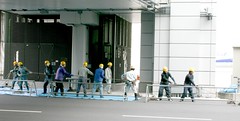Monday, October 18, 2010
Social Loafing in Japan
Social Loafing is the name of "the first" social psychological phenomena, wherein those working as a member of a team, such as pulling a rope, are less likely to put their back into it as when they are pulling the rope on their own. There is research to show that in Asian countries (but not this photograph!) reverse social loafing or 'social trying' is also found (Karau & Williams 1993). Other Japanese research (Kugihara, N., 1998) shows that Japanese men are inclined to engage in Social Loafing but Japanese women are not. And finally Yamagishi's extensive research (e.g. Yamagishi 1998, The structure of Trust) shows that Japanese are likely to engage in social loafing if they are not keeping check on each other, but in a face to face situation where they can censure each other, then they are likely to engage in social loafing (or at least subjects made distribution choices in a game experiment based, apparently, upon these assumptions).
If it is the case that, at least in face to face group situations, Japanese are more inclined to try harder when in a group, then I presume that this has big implications for management and education theory where social loafing theory encourages the individualisation of tasks, reward and responsibility so as to maximise individual pride in outcomes, and gains in self-esteem, and to minimise social loafing.
If it is the case that, at least in face to face group situations, Japanese are more inclined to try harder when in a group, then I presume that this has big implications for management and education theory where social loafing theory encourages the individualisation of tasks, reward and responsibility so as to maximise individual pride in outcomes, and gains in self-esteem, and to minimise social loafing.
This blog represents the opinions of the author, Timothy Takemoto, and not the opinions of his employer.

